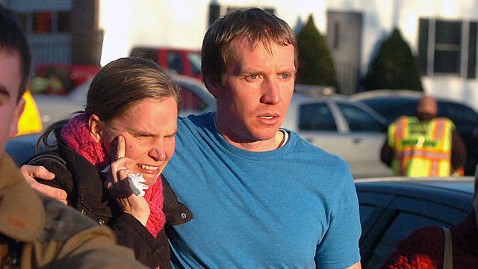BEIRUT (Reuters) - Syria's rebel leadership and the United States seized on Russian pessimism over President Bashar al-Assad's future to urge Moscow to help push its ally into ceding power and end the battles closing in around his capital.
"We want to commend the Russian government for finally waking up to the reality and acknowledging that the regime's days are numbered," the U.S. State Department spokeswoman said after a senior Kremlin envoy conceded publicly on Thursday that Assad's opponents could win the 20-month-old civil war.
"The question now is, will the Russian government join those of us in the international community who are working with the opposition to try to have a smooth democratic transition?" U.S. spokeswoman Victoria Nuland added in Washington.
In Marrakech, where his new coalition won recognition from other international powers as the legitimate leadership of Syria, rebel political leader Mouaz al-Khatib said he believed Russia, ally and arms supplier to the Assad dynasty since Soviet times, was looking for ways out of its support for a lost cause.
"I believe that the Russians have woken up and are sensing that they have implicated themselves with this regime, but they don't know how to get out," al-Khatib told Reuters. He held them "particularly responsible" for helping Assad with arms but said Moscow need not "lose everything" in Syria if it changed tack.
Under President Vladimir Putin, wary since last year's Libyan war of what Russia sees as a Western drive to use the United Nations to overthrow national leaders it dislikes, Russia has blocked U.N. efforts to squeeze Assad, who has also had strong support from his long-time sponsor Iran.
But Mikhail Bogdanov, a deputy foreign minister and the Kremlin's special envoy for Middle East affairs, was quoted as saying in Moscow: "One must look the facts in the face."
"Unfortunately, the victory of the Syrian opposition cannot be ruled out." The Syrian government, he said, was "losing control of more and more territory" and Moscow was preparing to evacuate Russian citizens if necessary.
Nuland said Bogdanov's comments demonstrated that Moscow now "sees the writing on the wall" on Syria and said Russia should now rally behind U.N. efforts to prevent a wider bloodbath.
"They can withdraw any residual support for the Assad regime, whether it is material support (or) financial support," she said. "They can also help us to identify people who might be willing, inside of Syria, to work on a transitional structure."
DIPLOMACY
International envoy Lakhdar Brahimi, who has met Russian and U.S. officials twice in the past week, is seeking a solution based on an agreement reached in Geneva in June that called for the creation of a transitional government in Syria.
But Russia has repeated warnings that recognition of al-Khatib's coalition, notably by the United States, is undermining diplomacy, and rejected U.S. contentions that the Geneva agreement sent a clear message that Assad should step down.
Nuland said the Brahimi meetings could lay the framework for a political structure to follow Assad:
"We've said all along to the Russians that we are concerned that the longer that this goes on, and the longer it takes us to get to an alternative political path for Syria, the only path is going to be the military one and that is just going to bring more violence.
"We all ought to be working together."
Bogdanov, whose government has suggested that Assad himself should be allowed to see through a transition he has promised, suggested the rebels and their allies were set on a military solution and he gave little hint of detente with Washington.
"The fighting will become even more intense and (Syria) will lose tens of thousands and, perhaps, hundreds of thousands of civilians," Bogdanov was quoted as saying. "If such a price for the removal of the president seems acceptable to you, what can we do? We, of course, consider it absolutely unacceptable."
The head of NATO, Anders Fogh Rasmussen, said elsewhere: "I think the regime in Damascus is approaching collapse."
A U.S. official said: "Assad probably still believes that Syria is his and illusions can die hard. But Assad and those closest to him have got to be feeling the psychological strain of fighting a long war that is not going their way."
DAMASCUS BATTLES
But Al-Khatib, who played down Western concerns of sectarian Sunni Islamists in rebel ranks, warned that the fighting was far from over, even as it has begun to rattle the heart of Assad's power in Damascus. On Wednesday, a car bomb killed at least 16 people in a nearby town which is home to many military families.
"The noose is tightening around the regime," al-Khatib said.
"(But) the regime still has power. People think that the regime is finished, but it still has power left, but it is demoralized and however long it lasted its end is clear."
Day and night, Damascenes can hear the thunderous sound of bombardment aimed at rebel-held and contested neighborhoods.
The city's streets have now turned into a labyrinth of checkpoints and road blocks, with several major roads permanently closed off to traffic by concrete barriers.
"We escape from one place and trouble follows," said one grandmother, Um Hassan, as she described to Reuters her family's flight from one neighborhood to another as fighting seeps into the capital. "I don't know where we can keep running to."
Nonetheless, al-Khatib played down demands for their allies to provide heavier weaponry - a request long resisted by governments wary of anti-aircraft missiles and other hardware reaching Islamist rebels who might turn them against the West.
"The Syrian people ... no longer need international forces to protect them," he said, not specifying whether he meant a no-fly zone, arms supplies or other military support.
The opposition chief said he was willing to listen to proposals for Assad to escape with his life - "The best thing is that he steps down and stops drinking the blood of the Syrian people" - and outlined three scenarios for a change of power:
Al-Khatib ruled out the Russian proposal suggesting Assad hand over power to a transitional government while remaining president, saying it was "disgraceful for a slaughtered nation to accept to have a killer and criminal at its head".
The British-based Syrian Observatory said war planes bombed rebel-held eastern suburbs of Damascus on Thursday and artillery was hitting Daraya and Moadamiyeh, southwestern areas near the centre where rebels have been fighting for a foothold.
Syria has relied on war planes and helicopters to bombard rebel districts but Damascus denied accusations by U.S. and NATO officials that it had fired Scud missiles in recent days. The foreign ministry said the long-range missiles were not used against "terrorist groups," a term it uses for the rebels.
At least 40,000 people have been killed in Syria's uprising, which started in March 2011 with street protests which were met with gunfire by Assad's security forces, and which spiraled into the most enduring and destructive of the Arab revolts.
(Additional reporting by Steve Gutterman in Moscow and Andrew Quinn in Washington; Writing by Alastair Macdonald; Editing by Michael Roddy) For an interactive look at the uprising in Syria, please click on http://link.reuters.com/rut37s



























